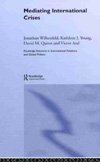 Mediating International Crises
Mediating International CrisesRoutledge
© 2005
ISBN: 0415700671
pages 235
by Jonathan Wilkenfeld, Kathleen (Young) Smarick, David Quinn, Victor Asal
International crises are dangerous episodes that can be destabilizing not only to the actors directly involved but to the entire international system. Crises can present overwhelming challenges to established institutions and belief systems and can change forever the distribution of power within the international community or in a regional subsystem. Recognizing the primacy of crises as defining moments in international relations, scholars and policy makers alike are increasingly concerned with identifying mechanisms for crisis prevention, management, and resolution. In this book, we investigate one such mechanism – mediation by a third party – to determine whether it is an effective means of mitigating, or at least managing, the all-too-often turbulent and violent consequences of crises.
Historically, states have employed a wide array of mechanisms to contain, manage, and resolve their crises with other members of the international system. International Crisis Behavior (ICB) data on crises in the twentieth century finds that half of all crisis actors relied on violence either exclusively or in conjunction with other techniques to manage their crises. The remaining actors employed a variety of non-violent approaches, ranging from negotiation, adjudication and arbitration, mediation, and non-violent military actions, in an effort to achieve their goals within a crisis. Any evaluation of the effectiveness of these various approaches must consider a number of questions: Does it prevent crisis escalation? Does it help to bring crises to an end more rapidly? Are crisis actors satisfied with the outcome of the crisis? Does a legacy of tension result following the crisis? Further, is the effectiveness of any of these approaches either undermined or exacerbated by the specific context of a crisis? All of these issues are relevant in determining the merits, and possible drawbacks, of each approach. This study explores these issues as they relate to mediation using both statistical analyses of data from historical events as well as complex human-based simulations of international crisis mediation events.


